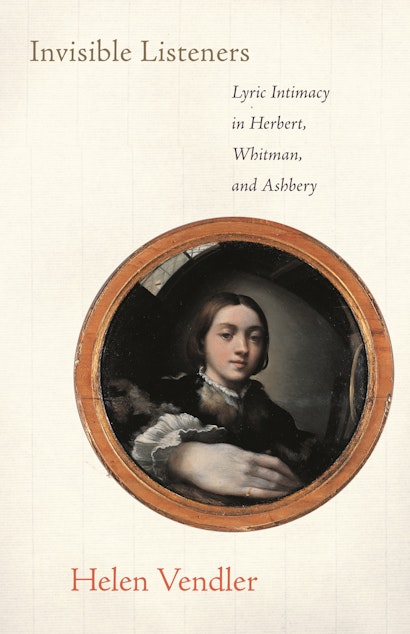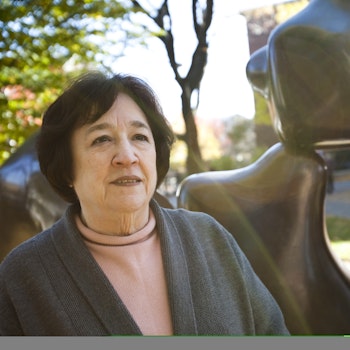When a poet addresses a living person—whether friend or enemy, lover or sister—we recognize the expression of intimacy. But what impels poets to leap across time and space to speak to invisible listeners, seeking an ideal intimacy—George Herbert with God, Walt Whitman with a reader in the future, John Ashbery with the Renaissance painter Francesco Parmigianino? In Invisible Listeners, Helen Vendler argues that such poets must invent the language that will enact, on the page, an intimacy they lack in life.
Through brilliantly insightful and gracefully written readings of these three great poets over three different centuries, Vendler maps out their relationships with their chosen listeners. For his part, Herbert revises the usual “vertical” address to God in favor of a “horizontal” one-addressing God as a friend. Whitman hovers in a sometimes erotic, sometimes quasi-religious language in conceiving the democratic camerado, who will, following Whitman’s example, find his true self. And yet the camerado will be replaced, in Whitman’s verse, by the ultimate invisible listener, Death. Ashbery, seeking a fellow artist who believes that art always distorts what it represents, finds he must travel to the remote past. In tones both tender and skeptical he addresses Parmigianino, whose extraordinary self-portrait in a convex mirror furnishes the poet with both a theory and a precedent for his own inventions.
By creating the forms and speech of ideal intimacy, these poets set forth the possibility of a more complete and satisfactory human interchange—an ethics of relation that is uncoerced, understanding, and free.
Helen Vendler (1933–2024) was the A. Kingsley Porter University Professor of English at Harvard University. Her books include Poets Thinking: Pope, Whitman, Dickinson, Yeats; Coming of Age as a Poet: Milton, Keats, Eliot, Plath; and Seamus Heaney. Her reviews of contemporary poetry and criticism have appeared in the New York Review of Books, The New Yorker, the New Republic, and other publications.
"Helen Vendler['s] . . . Invisible Listeners, a compact study of "lyric intimacy" in three poets, demonstrates, if you have forgotten, some of the best reasons to read literary criticism."—Langdon Hammer, The New York Times Book Review
"[A] compact and lively little book. . . . Vendler's brisk and light touch, her ability to pick at a line for every bit of meaning, makes this an enjoyable and moving book."—Angela Leighton, Times Literary Supplement
"As poetry is not read but re-read, so Vendler's handsome analysis should be, the art of engaged reading."—Leeta Taylor, Foreword Magazine
"A new book by Helen Vendler is always cause for excitement, especially to readers of poetry. Invisible Listeners goes to the heart of our experience of lyric. It reinforces one of Vendler's central beliefs: that lyric is not just a decorative art, but an art crucial to our social and ethical lives."—Bonnie Costello, Boston University, author of Shifting Ground: Reinventing Landscape in Modern American Poetry
"Helen Vendler has written an exemplary book of critical reading, an expert commentary whose quietly assumed learning is a model of critical modesty and strength. She has always been able to convey the subtle effects of poetic art, and here, once again, her luminous interpretations catch fire in a voicing of great lyric verse."—Angus Fletcher, City University of New York, author of A New Theory for American Poetry
"With her hallmark expertise, Helen Vendler analyzes various strategies observable in each poet at issue and (as usual) shows herself to be absolutely at home in admiring the procedures of very different poets. This is a highly professional exercise, dedicated—as Vendler is always dedicated—to enhancing the aesthetic rewards of engaged reading."—William H. Pritchard, Amherst College, author of Shelf Life: Literary Essays and Reviews


